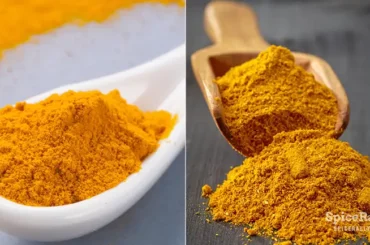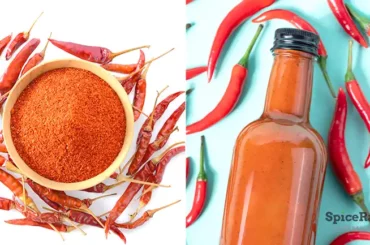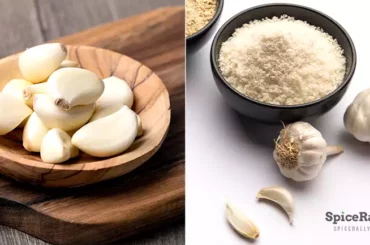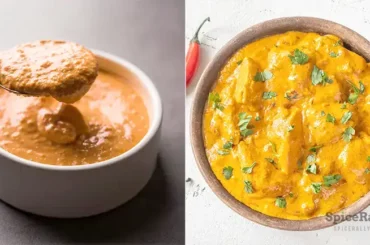Cumin and fennel are easily mistaken spices that are often associated with sweet and savory cooking. Thus, we thought to share some important facts about cumin vs fennel from this SpiceRally episode.
Cumin has a nuttier, earthier, and warmer element with a slight hint of smokiness, sweetness, and citrus notes. But fennel, on the other hand, has bolder licorice and anise notes with a sweeter undertone. And the whole fennel seed is slightly larger than the cumin seed, while they also differ in color.
So, keep reading to learn in-depth about the differences and similarities between these two spices.
| Cumin | Fennel | |
|---|---|---|
| Flavor profile | Has an earthier, warmer, nuttier undertone than that of fennel with slightly smoky, citrusy and sweet notes. Click on this link and refer to our detailed article to know everything you need to learn about mighty cumin. | It is sweeter than cumin with potent licorice and anise hints. |
| Aroma profile | Highly and pleasantly aromatic with a herbal, floral, woody, and minty undertone. | Not as aromatic as cumin but has a warm, sweet smell. |
| Appearance | – Cumin seed is more compact than the fennel seed. It is slender and brownish in color. – Ground cumin is darker than ground fennel. | – Fennel seed is considerably larger than the cumin seed and slightly plump and greenish in color. – Ground fennel has a lighter hue than ground cumin. |
| Forms used and availability | Widely available in supermarkets, online shopping sites, and grocery stores as: – Ground cumin – Whole cumin seeds – Cumin capsules – Cumin-infused tea – Cumin essential oil | Widely available in supermarkets, online shopping sites, and grocery stores as: – Whole fennel seeds – Ground fennel – Fennel essential oil – Fennel extract infused-hand soap or perfumes – As a tea – Fennel capsules |
| Purpose in cooking | As an ingredient | As an ingredient |
| Usage in cooking | – As a healthy beverage and to infuse with herbal tea. – Predominantly used as a tempering spice in most Indian/ Sri Lankan savory dishes. – To blend into dips, sauces, and salad dressings. – As an essential element in meat dry/ wet rubs, marinades, spice blends, and seasonings. – To make certain types of baked goods like bread, buns, spiced cakes, sweets, and desserts. | – Whole seeds and ground fennel is used in making sweet chutneys and pickles. – Ground fennel is used in many spice and seasoning blends. – It is added to flavor traditional sweets and desserts. – Spices up meat, fish, or vegetable dishes. – It is used to make healthy, herbal teas. |
| General use | – In cooking and baking – In modern pharmacology – For home remedies as folk medicine | – In cooking and baking – In modern pharmacology – For home remedies as folk medicine – Used in cosmetology |
| Health benefits | – Works as an excellent carminative Reduced bad cholesterol levels in the body. – Contains antioxidants and anti-inflammatory properties – Helps to ease the symptoms of Irritable Bowel Syndrome. – Aids in weight loss and obesity. | – Promotes healthy digestion – Freshens breath – Helps to regulate blood pressure – Suppresses appetite – Aids in heart health – May have potential cancer-fighting properties |
| Scientific name | Cuminum cyminum | Foeniculum vulgare |
| Plant family | Apiaceae (parsley family) | Apiaceae (parsley family) |
| Active compounds | Volatile oils (cuminaldehyde, cymene, terpenoids) | – Trans-anethole – 2-pentanone – Fenchone – Benzaldehyde-4-methoxy |
| Shelf life | – Both ground and whole cumin will stay flavorful for up to 3-4 years. – But ground cumin could lose its potency sooner than whole cumin seeds. | – Both ground and whole fennel seeds will stay well for up to 3-4 years. – But, ground fennel tends to lose its potency sooner than the whole seeds. |
Further Explanation Of The Difference Between Cumin And Fennel…
Cumin and fennel often go hand in hand, especially in Indian dishes. In fact, both of these spices are staples in Indian cuisine due to the great pair they make together. They have their own dynamic flavor and aroma notes to add definition to a certain dish.
Due to the sweeter hint of fennel, it is a great compliment for sweet dishes, baked goods, and beverages than cumin. At the same time, cumin goes well with spicier and more savory, richly-flavored dishes. However, cumin is predominant in most curry powder varieties, while fennel seeds are also used in many spice blends but comparatively lesser in amount than that of cumin.
Nevertheless, both of these spices are high in medicinal value. Cumin is an excellent source of Iron, Vitamin A, and Vitamin B1, while fennel is usually richer in Fiber, Manganese, Calcium, Copper, Vitamin C, and Vitamin B3. Moreover, fennel seeds contain 16 times less saturated fat than cumin, and both of these ingredients provide a number of health benefits.
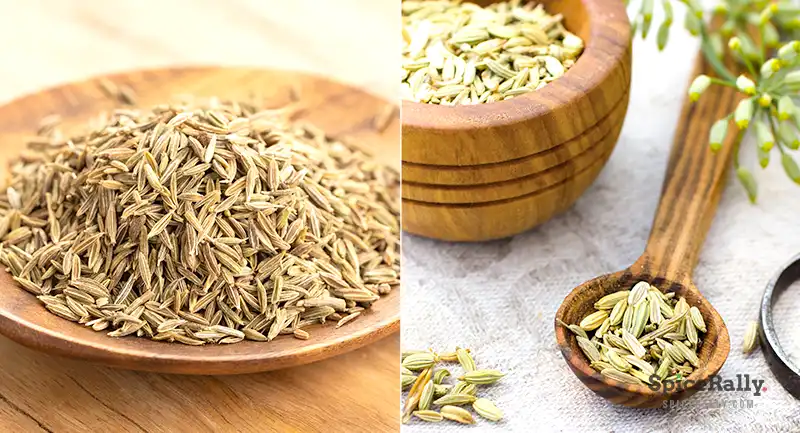
Can Fennel Be Used In Place Of Cumin And Vice Versa?
Fennel is a versatile spice that could be substituted in place of cumin and vice versa. Both are good to go as alternatives for one another in both sweet and savory dishes. You may savor a slight flavor difference, yet that doesn’t give an odd flavor, aroma, or color when replaced.

